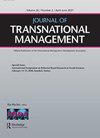The concepts of power in international business negotiations: An empirical investigation
引用次数: 4
Abstract
ABSTRACT This article examines the bases of social power, namely individual information power, expert power, legitimate power, and referent power on successful international business negotiations (IBNs). The author conducted an online survey among international business executives working in the UK for multinational corporation subsidiaries who were asked to report on the success of their most recent negotiating experience in terms of cooperative (integrative) and competitive (distributive) outcomes. Information power, expert power, and referent power were supported by these results in terms of significance. Unexpectedly, however, information power was positively correlated with integrative or cooperative outcomes and processes. The correlation related to legitimate power was negative but not statistically significant so this hypothesis was not supported. Our results not only contribute to international negotiation theory, but also can assist in the selection and training of practitioners. The academic contribution of this study also relates to model exploration. It brings causal statistical objectivity to qualitatively developed concepts as an essential step in development of knowledge. These theoretical and managerial implications of the study are examined. Furthermore, directions for future research that build on the findings of the study are indicated.国际商务谈判中的权力概念:实证研究
摘要本文考察了成功国际商务谈判的社会权力基础,即个人信息权力、专家权力、合法权力和参考权力。作者对在英国为跨国公司子公司工作的国际企业高管进行了一项在线调查,要求他们就合作(整合)和竞争(分配)结果报告他们最近谈判经验的成功程度。信息权力、专家权力和参考权力在显著性方面得到了这些结果的支持。然而,出乎意料的是,信息权力与整合或合作的结果和过程呈正相关。与合法权力相关的相关性为负,但统计上不显著,因此该假设不被支持。我们的研究结果不仅对国际谈判理论有贡献,而且对国际谈判从业者的选择和培训也有帮助。本研究的学术贡献还与模型探索有关。它将因果统计客观性引入定性发展的概念,作为知识发展的重要步骤。这些理论和管理意义的研究进行了审查。此外,本文还指出了基于研究结果的未来研究方向。
本文章由计算机程序翻译,如有差异,请以英文原文为准。
求助全文
约1分钟内获得全文
求助全文
来源期刊

Journal of Transnational Management
Social Sciences-Development
CiteScore
2.30
自引率
0.00%
发文量
10
期刊介绍:
As the economic marketplace expands across continents and cultures, it is essential to establish a world-wide network of ideas and information that serves your transnational business interests. The Journal of Transnational Management (retitled from the Journal of Transnational Management Development to better reflect its focus) is an international forum that examines management research, teaching and training techniques, consulting, and development issues from a multicultural perspective, presenting practical business strategies that produce results on a global scale. The Journal of Transnational Management is a comprehensive resource for management in foreign environments, presenting an exchange of conceptual and empirical research on an international level. Articles written by business practitioners, management development experts, and academicians address issues related to firms, public enterprises, educational institutions, and nonprofit organizations throughout the world.
 求助内容:
求助内容: 应助结果提醒方式:
应助结果提醒方式:


